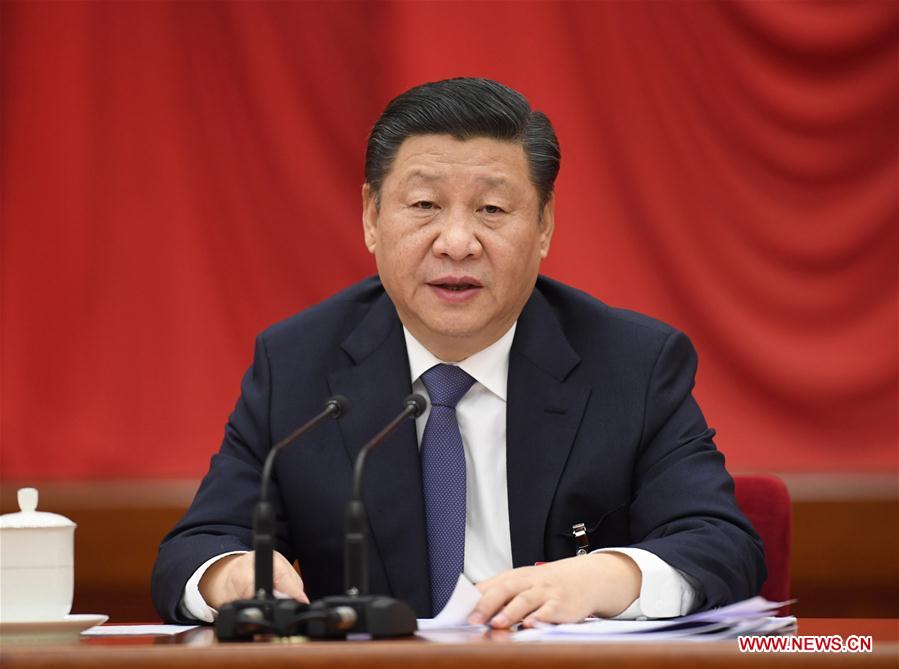
Xi Jinping, general secretary of the Communist Party of China (CPC) Central Committee, speaks at the second plenary session of the 19th CPC Central Committee, held in Beijing, capital of China, from Jan. 18 to 19. (Xinhua/Li Xueren)
BEIJING, Jan. 19 (Xinhua) -- The Communist Party of China (CPC) Central Committee Friday proposed writing Xi Jinping Thought on Socialism with Chinese Characteristics for a New Era into the Constitution.
Major theoretical achievements, principles and policies adopted at the 19th CPC National Congress should be incorporated into a revision to the Constitution, according to a communique issued after the second plenary session of the 19th CPC Central Committee held in Beijing Thursday and Friday.
A proposal from the CPC Central Committee on the revision was adopted at the meeting.
New achievements, experiences and requirements of the development of the Party and nation should be embodied in the revised Constitution, according to the communique.
"We should keep pace with the times and improve the Constitution while maintaining its consistency, stability and authority," the document said.
A total of 203 members of the CPC Central Committee and 172 alternate members attended the session, with Xi, general secretary of the CPC Central Committee, delivering a speech.
The CPC Central Committee called on the whole Party to unite around it, with Xi at the core, and adhere to "socialist rule of law with Chinese characteristics."
WHY AMEND?
The People's Republic of China enacted its first Constitution in 1954. In 1982, the fifth National People's Congress adopted the present Constitution, which underwent four amendments in 1988, 1993, 1999 and 2004.
"The Constitution has been improved together with the country's changing reality and development of the Party and nation," the communique said.
Since the last amendment in 2004, the Party and the country have been through important changes.
"The 19th CPC National Congress made important strategic deployments in socialism with Chinese characteristics under the new era," the communique said.
It is necessary to amend the Constitution to incorporate theoretical, practical and institutional achievements made by the Party and the people, according to the communique.
WHAT IS HIGHLIGHTED
-- Xi Jinping Thought on Socialism with Chinese Characteristics for a New Era is a guideline that the Party and state will uphold in the long run.
-- Leadership of the Party must be strengthened and upheld in all areas of endeavor.
-- The five-sphere integrated plan, which is to promote coordinated economic, political, cultural, social and ecological advancement, and the new vision of innovative, coordinated, green and open development that is for everyone, are vital for national rejuvenation.
-- The goals of finishing the building of a moderately prosperous society in all respects by 2020, basically realizing socialist modernization by 2035, and building China into a great modern socialist country by the middle of the 21st century, are also emphasized.
-- Following the path of peaceful development, pursuing a mutually beneficial strategy of opening up, and promoting the building of a community with a shared future for mankind are of great significance to the cause of peaceful development for humanity.
-- The reform to establish a national supervisory system, which is under the Party's leadership and covers all who exercises public power, is a significant political system reform and a major decision to strengthen the self-supervision of the Party and the state.
ALL SHALL OBEY THE CONSTITUTION
The CPC Central Committee communique stressed the important role of the Constitution in state governance and pledged to guarantee its implementation.
"Efforts to adhere to the rule of law should give priority to the rule of Constitution. Efforts to adhere to the governing by law should put the governing in line with the Constitution in the first place," the document said.
"All anti-Constitutional behavior shall be corrected, without fail," said the communique. "No organization or individual has the power to overstep the Constitution or the law."
All people, state organs, armed forces, political parties, civil groups, public institutions and companies should take the Constitution as their fundamental guide to activities.
"People at every level of public office, especially leading officials, should exercise power and work according to the Constitution and the law and subject themselves to supervision of the people," the communique stressed.



